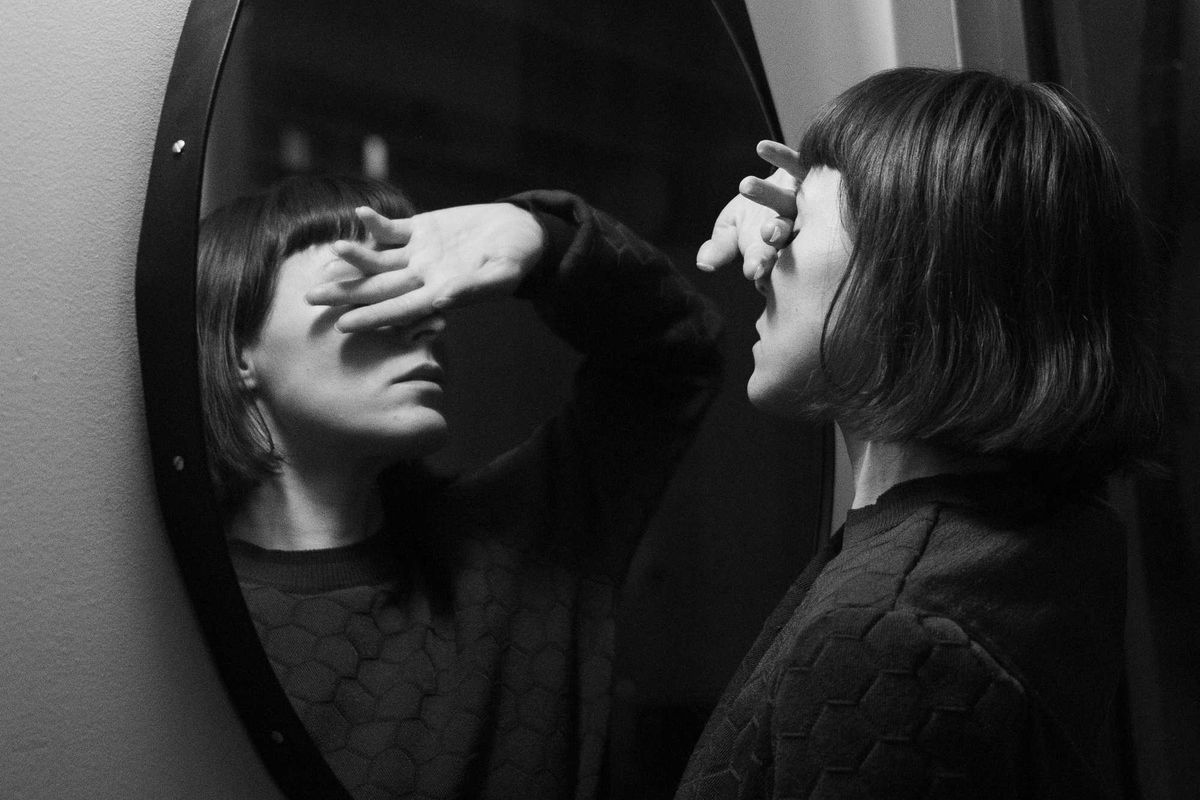There's a reason why some people are perfect at copying accents and others just can't
It's a lot easier if you're neurodivergent.
A woman in black long sleeve shirt stands in front of mirror.
Have you ever had that friend who goes on vacation to London for four days and comes back with a full-on posh Queen's English accent? "Oooh, I left my brolly in the loo," they say, and you respond, "But you're from Colorado!" Well, there are reasons they (and many of us) do that, and usually it's on a pretty subconscious level.
It's called "accent mirroring," and it's actually quite common with people who are neurodivergent, particularly those with ADHD (Attention Deficit Hyperactivity Disorder). According Neurolaunch, the self-described "Free Mental Health Library," "Accent mirroring, also known as accent adaptation or phonetic convergence, is the tendency to unconsciously adopt the accent or speech patterns of those around us. This linguistic chameleon effect is not unique to individuals with ADHD, but it appears to be more pronounced and frequent in this population."
What is accent mirroring?
Essentially, when people have conversations, we're constantly "scanning" for information—not just the words we absorb, but also the inflection and tone. "When we hear an accent, our brains automatically analyze and categorize the phonetic features, prosody, and intonation patterns," writes Neurolaunch. For most, this results in copying the accent of the person we're speaking with. But those with ADHD might be more sensitive to auditory cues. This, "coupled with a reduced ability to filter out or inhibit the impulse to mimic…could potentially explain the increased tendency for accent mirroring."
While the article explains further research is needed, they distinctly state that, "Accent mirroring in individuals with ADHD often manifests as an unconscious mimicry of accents in social situations. This can range from subtle shifts in pronunciation to more noticeable changes in intonation and speech rhythm. For example, a person with ADHD might find themselves unconsciously adopting a Southern drawl when conversing with someone from Texas, even if they’ve never lived in the South themselves."
Do people with ADHD pick up on accents more easily?
People are having their say online. On the subreddit r/ADHDWomen, a thread began: "Taking on accents is an ADHD thing?" The OP shares, "My whole life, I've picked up accents. I, myself, never noticed, but everyone around me would be like, 'Why are you talking like that??' It could be after I watched a show or movie with an accent or after I've traveled somewhere with a different accent than my 'normal.'
They continue, "Apparently, I pick it up fast, but it fades out slowly. Today... I'm scrolling Instagram, I watch a reel from a comedian couple (Darcy and Jeremy. IYKYK) about how Darcy (ADHD) picks up accents everywhere they go. It's called ADHD Mirroring??? And it's another way of masking."
(The OP is referring to Darcy Michaels and his husband, Jeremy Baer, who are both touring comedians based in Canada.)
Hundreds of people on the Reddit thread alone seem to relate. One comments, "Omfg I've done this my whole life; I'll even pick up on the pauses/spaces when I'm talking to someone who is ESL—but English is my first language lol."
Sometimes, it can be a real issue for those around the chameleon. "I accidentally mimicked a waitress's weird laugh one time. As soon as she was out of earshot, my family started to reprimand me, but I was already like 'oh my god I don’t know why I did that, I feel so bad.'"
@theweirdocoach Anyone else? #adhdawareness #adhdinwomen #neurodivergent
Some folks say that ADHD is a superpower, and it seems that for some with the condition, it gives them a unique gift. The ability to mimic other people's accents, which, when done in the correct setting, is really fun to watch. That's probably why so many comedians, including Jim Carrey, Robin Williams, and Pete Davidson, have alluded to having ADHD in interviews.
This article originally appeared in May.

